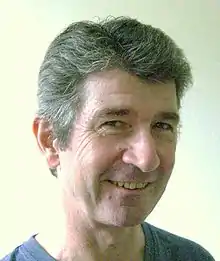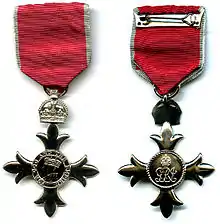Paul S. Farmer
Paul Stephen Farmer MBE is a retired British educationalist who developed the use of pop music in school music education in the 1970s, and is reputed to be the first to devise a public examination in the UK exclusively in pop music.[1] He wrote several music education books and became a London comprehensive school head teacher at the age of 33.[2]
Paul Farmer MBE | |
|---|---|
 2009 Election photo | |
| Born | April 1950 Woodford Green, Essex |
| Nationality | British |
| Occupation | Retired |
| Known for | Devising the first UK school exam in pop music |
| Website | www |
Education
Farmer was born in Woodford Green, Essex, the son of an examiner in HM Patent Office. After Woodford Green Preparatory School[3] he won an LEA grant to Chigwell School, where he learnt to play the organ. He was accepted as an undergraduate by both the Royal College of Music and Royal Academy of Music and attended the former. There he gained the ARCM diploma and took the joint College and Academy graduate course (GRSM). He began his career as a secondary school music teacher and later studied part-time at London University’s Institute of Education, where he took both the Diploma and MA in Education.[2]
Awards & Honours

In 1997 the Chartered Management Institute admitted Farmer to membership as a Fellow (FCMI), recognising his work in school management. In December 2012 he became a Fellow of the Royal Society of Arts (FRSA) and the following June he was appointed MBE by HM The Queen in the Birthday Honours list, for services to the community in Suffolk.[4]
Teaching career
In 1974, after two years' teaching, Farmer was appointed Head of Music at Holland Park School, London, where he developed the use of pop music in music teaching.[5] He created the first public examination in pop music,[6] a mode III Certificate of Secondary Education (CSE)[7] which was first administered in 1976.[8] The exam was devised to motivate a group of fourth form pupils who did not want to follow the existing music exam course,[9] including Angus Gaye (aka Drummie Zeb) who went on to form the reggae group Aswad.[10]
Out of this course emerged what was claimed to be the first classroom textbook in pop music,[11] Pop Workbook, co-written by Farmer and Tony Attwood[12] and first published in 1978. Demand for the book led to its reprinting in 1979 and 1982. Alongside Holland Park's 4th/5th year course in pop music Farmer devised similar but broader modules for 11- to 14-year-olds which were later published as the Longman Music Topics.[13] In 1979 the first edition of Farmer's book Music in the Comprehensive School was published, written for teachers and students of education,[14] with a slightly larger second edition in 1984.
In 1981 Farmer became Deputy Head of Dick Sheppard School, a mixed comprehensive in Brixton noted for its left-wing activists on the teaching staff.[15] He was subsequently appointed its Head Teacher at the age of 33 and was described as the Inner London Education Authority's (ILEA's) youngest head.[16] His four years of headship were eventful (see WP entry for school) and after successfully applying for the headship of a larger school in 1987, he was eventually succeeded by Philip Lawrence QGM,[17] who was murdered outside the school gates of his own subsequent headship.
Later life
After the ILEA was abolished Farmer left London for Suffolk and held a number of part-time posts, teaching and examining music, including Choirmaster at Old Buckenham Hall prep school. He also founded and ran the first registered UK charity specialising in exclusively male health problems, The Men's Health Trust.[18]
In 2003 Farmer was elected to St Edmundsbury Borough Council and Bury St Edmunds Town Council.[19] He has served on St Edmundsbury's cabinet, first as Arts & Culture portfolio holder,[20] where he immediately got embroiled in the "dangerous" headstone controversy[21] and closing the Manor House Museum.[22] The latter action was deeply unpopular with many of his electors and a possible reason that he lost votes in the 2007 election, though still winning by a comfortable majority.[23][24] From May 2007 he became responsible for finance.[25] He was elected to Suffolk County Council in 2009[26] and after a spell as town, borough and county councillor resigned from the county council and reduced his borough council responsibilities in 2010 for health reasons.[27] He was re-elected to the historic town centre ward of Abbeygate on both St Edmundsbury borough council and Bury St Edmunds town council in May 2011 with nearly 60% of the votes cast.[28] In February 2015 he announced that he would not be seeking re-election in May 2015.[29]
Main published works
- Attwood, Tony; Paul Farmer (1978). Pop Workbook. Edward Arnold. ISBN 978-0-7131-0155-3.
- Farmer, Paul (1979). Music in the Comprehensive School. Oxford University Press. ISBN 978-0-19-317418-4.
- Farmer, Paul (1982). A Handbook of Composers and Their Music. Oxford University Press. ISBN 978-0-19-321092-9.
- Farmer, Paul, ed. (1984). Music in Practice: A Collection of Music Projects for the Comprehensive School. Oxford University Press. ISBN 978-0-19-321094-3.
- Series
- Longman Music Topics A series of classroom booklets, Longman 1979-1986, including:
- Into the Classics. Longman. 1979. ISBN 0-582-21576-5.
- Pop. Longman. 1979. ISBN 0-582-21577-3.
- Ragtime and Blues. Longman. 1979. ISBN 0-582-21579-X.
- Recording and Electronics. Longman. 1979. ISBN 0-582-21578-1.
- Into the Modern Classics. Longman. 1981. ISBN 0-582-20096-2.
- Steelbands and Reggae. Longman. 1981. ISBN 0-582-20097-0.
- Instruments of the Orchestra. Longman. 1982. ISBN 0-582-20018-0.
- The Story of Pop. Longman. 1982. ISBN 978-0-582-20017-3.
- Instruments in Pop and Jazz. Longman. 1985. ISBN 0-582-20218-3.
- (with F. Reilly) Music in Show Business. Longman. 1986. ISBN 0-582-20217-5.
Title and style of address
- Paul Farmer (up to May 2003)
- Councillor Paul Farmer (from May 2003)
- Councillor Paul Farmer MBE (from June 2013)
- Paul Farmer MBE (from May 2015)
References
- A Place for Pop, Times Educational Supplement 16.7.1976, pp 31 & 33; Pop Music in the Secondary School, Music in Education (Novello & Co Ltd) Sept/Oct 1976 vol 40 no 381 ISSN 0027-433X page 217 (also mentioned by Lucy Green on pg 151 of Music on deaf ears, 1988 Manchester University Press 0-7190-2647-4); Pop Music in School Studies, Australia Daily News, 19 May 1976
- "About Paul Farmer". PaulFarmer.com. 7 March 2007. Retrieved 24 September 2011.
- The OC Mitre, the magazine of Chigwell Alumni, Issue 7, Dec 2011
- London Gazette 15 June 2013
- Pop in the Classroom in ILEA Contact, 14 May 1976 vol 5 Issue 3 (pub. Inner London Education Authority)
- Poly Victoros (1 October 2005). "WestFocus seminar report: Teaching resources for recorded music" (PDF). Retrieved 22 September 2011.
- Metropolitan Regional Examination Board
- Foot stompin' hard swottin' for exam sittin' , London Evening Standard, 2 June 1976, pg 11; The comprehensive rock report, Record Mirror & Disc, 10 April 1976, pp 22 & 23
- Chapter 7 from Farmer's Music in the Comprehensive School
- mtv.com
- "Archived copy". Archived from the original on 1 October 2011. Retrieved 24 September 2011.CS1 maint: archived copy as title (link) Bibliography of Tony Attwood
- Attwood, Tony; Farmer, Paul (1978). Pop Workbook - Tony Attwood, Paul Farmer - Google Books. ISBN 9780713101553. Retrieved 22 September 2011.
- Farmer, Paul. "Results for 'se:"Longman music topics"'". Worldcat.org. Retrieved 22 September 2011.
- Stephanie Pitts (2000). Reasons to teach music: establishing a place in the contemporary curriculum, British Journal of Music Education, 17, pp 32-42; Perceptions of Crystallising and Paralysing Factors in the Development of Student Teachers of Music in Scotland,
- House of Lords debate 5 February 1986 Lord Harris of Greenwich, Hansard 1236
- South London press, 25 September 1987, pg 14
- "The man who wouldn't hide - News". The Independent. 10 December 1995. Retrieved 22 September 2011.
- Man Trouble in The Sunday Times Style magazine 13 July 1997 pp 34-35; further info at http://opencharities.org/charities/1061184
- "Election Results St Edmundsbury Borough Council". Stedmundsbury.gov.uk. Retrieved 22 September 2011.
- "St. Edmundsbury Borough Council Cabinet" (PDF). 16 January 2007. Retrieved 22 September 2011.
- St Edmundsbury headstone policy
- "Charity joins bid to save museum - News - East Anglian Daily Times". Eadt.co.uk. Retrieved 22 September 2011.
- "Protest as museum collection dismantled - News - East Anglian Daily Times". Eadt.co.uk. Retrieved 22 September 2011.
- "St Edmundsbury Borough Council election 2007 - results A to K". Stedmundsbury.gov.uk. 17 June 2009. Retrieved 22 September 2011.
- pg 6 of St Edmundsbury cabinet meeting minutes 11 February 2009
- "Results table 2009 - Suffolk CountyCouncil Elections". Elections.suffolkcc.gov.uk. Archived from the original on 10 June 2009. Retrieved 22 September 2011.
- Published on Fri 1 October 08:00:50 BST 2010. "Councillor stepping back - Local Authority". Bury Free Press. Retrieved 22 September 2011.
- Thewils, Jo (6 May 2011). "Local elections - St Edmundsbury: Conservatives take seats from Liberal Democrats". Eadt.co.uk. Retrieved 22 September 2011.
- http://www.buryfreepress.co.uk/news/local/latest-news/long-serving-bury-st-edmunds-councillor-paul-farmer-to-stand-down-1-6595531